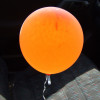Question
Do they actually have a thirst reflex, or does the fish's body automatically regulate the amount of fluid it retains and uses for bodily function as opposed to the amount it uses to breathe?
Answer
We put Jason's question to zoologist (and fish specialist) Max Gray:
Max - The short answer is no. The long answer is that you've got to consider three different types of fish. You've got fish that live in freshwater and then a fish that live in saltwater, and then also in saltwater in the oceans, you've got a separate type of fish. So, sharks and rays, they don't have bones. Their entire skeletons made of cartilage. So, we've got these three groups. Freshwater fish don't actually drink at all. They absorb all the water they need through their gills. So, they're fine. They don't ever get thirsty. Marine fish are what's called hypertonic to the seawater. So essentially, they lose water through their gills to the seawater. The seawater is saltier than their blood. in order to replenish that water, they have to drink seawater and process the salt out. But they live in seawater constantly. They can drink whenever they like. So really, they're never going to get thirsty because they're going to drink tiny amounts of seawater as and when they need it and keep themselves topped up. Sharks and rays are what's called isotonic with seawater. Their blood is exactly as salty as the water around them. All they need to do is adjust the iron concentrations in blood and so, that all happens across their gills and other permeable membranes and they're fine.
Chris - Can I chuck a spanner in the works?
Max - You can.
Chris - What about fish like salmon that are born in freshwater in the river, they go out into the sea, do their thing - eels do this as well - and then they come back to the river they were born in to spawn? How do they cope then?
Max - They're no exception either, but they just have very sophisticated gill membranes that can switch essentially from what is needed in a saltwater environment to what is needed in a freshwater environment. The various proteins and ion membranes involved in their gills will shuffle things around depending on which environment they're in. there is however one possible exception to the idea that fish don't get thirsty and this is fish that breath air. You may have heard of things like the lung fish or the most well-known one I think is mudskippers. They live in very, very poorly oxygenated ponds, shallow muddy ponds and they actually breath better with a very rudimentary lung that they have and they crawl out of the water, splash around in the mud and can breathe air for several days at a time. so in theory, they could spend long enough out of the water that they need to be driven back into the water by a thirst. Whether or not they feel thirsty starts to get into the realms of animal consciousness and that's an entirely separate question.




评论
Add a comment